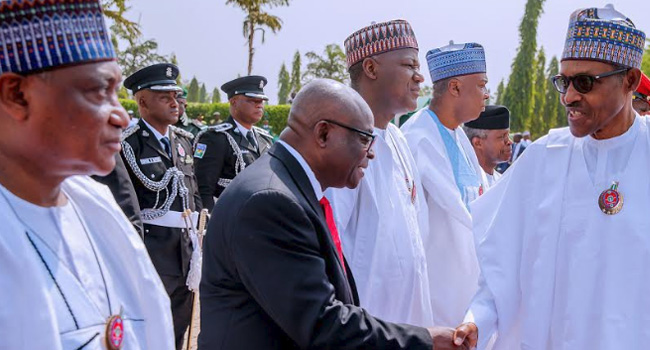By CrossRiverWatch Admin
According to Section 292 of the Nigerian Constitution, “A judicial officer shall not be removed from his office or appointment before his age of retirement except in the following circumstances – (a) in the case of – (ii) Chief Justice of Nigeria, President of the Court of Appeal, Chief Judge of the Federal High Court, Chief Judge of the High Court of the Federal Capital Territory, Abuja, Grand Kadi of the Sharia Court of Appeal of the Federal Capital Territory, Abuja and President, Customary Court of Appeal of the Federal Capital Territory, Abuja, by the President acting on an address supported by two-thirds majority of the Senate”.
President Muhammadu Buhari has suspended Walter Onnoghen as Chief Justice of Nigeria (CJN).
Onnoghen is standing trial for fraudulent declaration of assets.
Buhari based his decision on an order by the Code of Conduct Tribunal (CCT) issued on Wednesday, directing the suspension of the CJN.
A statement by the President on Friday evening noted that Onnoghen’s suspension is “pending final determination of the case against him at the Code of Conduct Tribunal”.
Buhari has also sworn in Ibrahim Tanko Mohammed as the acting CJN.
The question on everyone’s lips at the moment is whether the President has the capacity to direct the suspension of Onnoghen. Does he or does he not?
NO
Section 292 of the Nigerian Constitution reads as follows:
(1) A judicial officer shall not be removed from his office or appointment before his age of retirement except in the following circumstances –
(a) in the case of –
(i) Chief Justice of Nigeria, President of the Court of Appeal, Chief Judge of the Federal High Court, Chief Judge of the High Court of the Federal Capital Territory, Abuja, Grand Kadi of the Sharia Court of Appeal of the Federal Capital Territory, Abuja and President, Customary Court of Appeal of the Federal Capital Territory, Abuja, by the President acting on an address supported by two-thirds majority of the Senate.
(ii) Chief Judge of a State, Grand Kadi of a Sharia Court of Appeal or President of a Customary Court of Appeal of a State, by the Governor acting on an address supported by two-thirds majority of the House of Assembly of the State, Praying that he be so removed for his inability to discharge the functions of his office or appointment (whether arising from infirmity of mind or of body) or for misconduct or contravention of the Code of Conduct;
(b) in any case, other than those to which paragraph (a) of this subsection applies, by the President or, as the case may be, the Governor acting on the recommendation of the National Judicial Council that the judicial officer be so removed for his inability to discharge the functions of his office or appointment (whether arising from infirmity of mind or of body) or for misconduct or contravention of the Code of Conduct.
(2) Any person who has held office as a judicial officer shall not on ceasing to be a judicial officer for any reason whatsoever thereafter appear or act as a legal practitioner before any court of law or tribunal in Nigeria.
The forgoing proves that the President lacks the powers to ‘remove’ Onnoghen, but this is only true to the extent that ‘removal’ includes both temporary, like a suspension, and permanent removal from office.
YES
There could also be an argument that the President hasn’t ‘removed’ Onnoghen but has only suspended him, meaning Onnoghen’s return to the office, should he be cleared of fraudulent asset declaration charges, is also possible. In the event that ‘suspension’ does not constitute ‘removal’, then the President would be seen as not having violated the law.
THE FINAL ANSWER
Only the lawyers, really, can tell us clear-cut. Let the debate begin!
Culled From SaharaReporters.

Leave feedback about this